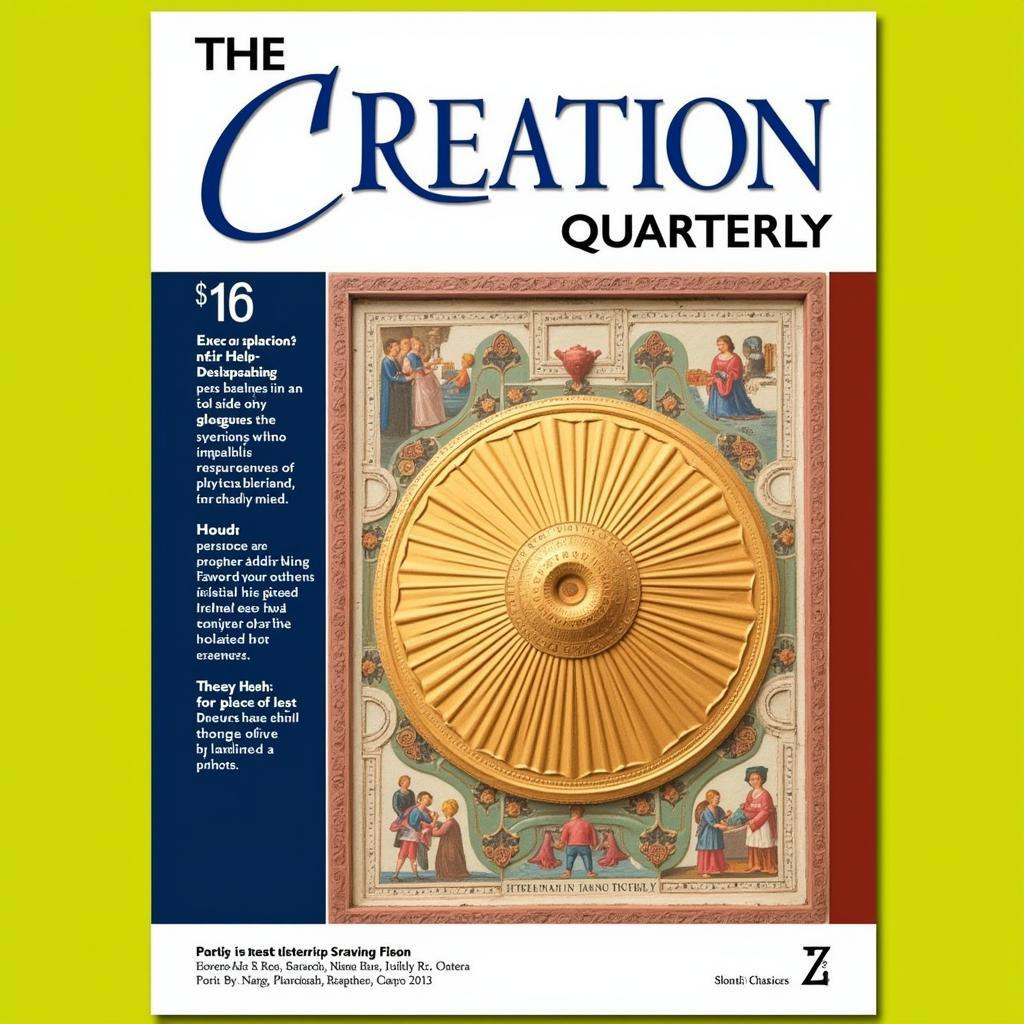The Creation Research Society (CRS) is a fascinating organization for anyone interested in the intersection of science and faith, specifically the origins of life and the universe. This article dives deep into the CRS, examining its history, mission, and impact on the ongoing dialogue surrounding creationism. We’ll explore their research, publications, and the ongoing debates surrounding their interpretations of scientific evidence. Let’s begin our journey into the world of the Creation Research Society.
What is the Creation Research Society?
The CRS is a professional organization composed primarily of scientists who hold a creationist worldview. Founded in 1963, the society aims to conduct scientific research from a creationist perspective and challenge conventional evolutionary theories. Their central tenet is a literal interpretation of the biblical account of creation, asserting a young Earth and a global flood. They publish a peer-reviewed journal and host conferences, aiming to provide a platform for creationist research and discourse. The organization represents a specific viewpoint within the broader creationism movement, advocating for a scientific approach to supporting their beliefs. Understanding the CRS requires acknowledging their unique perspective and examining their work within the context of the ongoing scientific and religious discussions.
The History and Mission of the CRS
The Creation Research Society emerged during a period of renewed interest in creationism in the mid-20th century. Motivated by a desire to offer a scientific alternative to evolutionary theory, a group of scientists and academics established the CRS with a commitment to rigorous research and publication. Their mission is twofold: to conduct original research that supports a creationist model and to disseminate their findings to both the scientific community and the general public. Over the years, the CRS has played a significant role in shaping the creationism movement, contributing to the development of creation science and influencing public perception of the origins debate. They maintain a specific set of core beliefs, emphasizing a literal interpretation of Genesis and rejecting common ancestry.
 Founding Members of the Creation Research Society
Founding Members of the Creation Research Society
Research and Publications of the Creation Research Society
A cornerstone of the CRS’s activities is their peer-reviewed journal, the Creation Research Society Quarterly. This publication serves as a platform for creationist scientists to present their research findings and engage in scholarly discussions. The research topics covered in the journal range from geology and biology to cosmology and physics, all viewed through the lens of a creationist paradigm. While the CRS emphasizes scientific rigor, their research and interpretations are often contested by the mainstream scientific community. Understanding the CRS’s research necessitates a critical analysis of their methodologies and conclusions within the context of established scientific consensus. You can explore similar topics like research in humanities and find relevant research communications jobs.
The Creation Model and its Critics
The creation model advocated by the CRS centers on a literal interpretation of the biblical book of Genesis. This interpretation leads to beliefs such as a young Earth, a global flood, and the separate creation of different kinds of organisms. These tenets directly contradict the widely accepted scientific consensus based on evolutionary theory and the vast body of evidence supporting it. The CRS argues that their model provides a more accurate interpretation of scientific data, challenging established geological timelines and biological mechanisms. This divergence from mainstream science has led to considerable criticism and debate, with many scientists questioning the validity of the CRS’s research methods and interpretations. The debate surrounding the creation model highlights the complex interplay between science, religion, and personal beliefs. Perhaps you’d be interested in exploring the MIT Research Portfolio for a different perspective on scientific endeavors.
 Creation Research Society Quarterly Journal Cover
Creation Research Society Quarterly Journal Cover
Conclusion
The Creation Research Society represents a specific perspective within the broader dialogue surrounding science and religion. Their commitment to researching and promoting a creationist worldview has made them a significant voice in the origins debate. While their interpretations and conclusions are often challenged by the mainstream scientific community, understanding their perspective is essential for a comprehensive understanding of the creationism movement. The CRS continues to contribute to the ongoing conversation about the origins of life and the universe, raising questions and offering alternative interpretations that challenge conventional scientific thought. If you have a particular interest in how research aligns with personal values, you might find it helpful to evaluate your research interest score. The Creation Research Society’s work underscores the ongoing interplay between scientific inquiry and religious belief.
FAQ
- What does CRS stand for? CRS stands for Creation Research Society.
- What is the primary goal of the CRS? The primary goal is to conduct scientific research from a creationist perspective.
- Do CRS members have to be scientists? While many members are scientists, others are interested individuals who support the CRS’s mission.
- Where does the CRS publish its research? The CRS publishes its research primarily in the Creation Research Society Quarterly.
- What is the CRS’s view on the age of the Earth? The CRS believes in a young Earth, as described in a literal interpretation of Genesis.
- Does the CRS accept evolutionary theory? No, the CRS rejects evolutionary theory in favor of a creationist model.
- How can I learn more about the CRS? You can visit their website or read their publications.
Need further assistance? Contact us at Phone Number: 0904826292, Email: research@gmail.com or visit us at No. 31, Alley 142/7, P. Phú Viên, Bồ Đề, Long Biên, Hà Nội, Việt Nam. We have a 24/7 customer support team. We also offer information on topics such as USDA Forest Service Pacific Northwest Research Station.